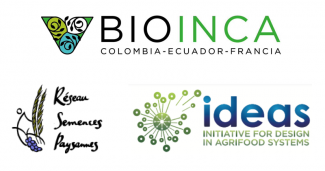
Innovation
Two main approaches
C-BASC cherche à susciter et à accompagner des changements transformateurs par l'innovation dans les pratiques de gestion, l'organisation sociale et les politiques publiques. En particulier, les activités d'innovation se concentrent sur le transfert de connaissances ainsi que des approches participatives pour la conception, l'application et l'évaluation de solutions transformatrices (c'est-à-dire la co-conception). Les activités d'innovation comprennent également des approches technologiques (par exemple, des capteurs optiques pour l'agriculture de précision), mais ce n'est pas notre objectif principal.
C-BASC seeks to engender and accompany transformative change through innovation in management practices, social organization and public policy. In particular, innovation activities focus on knowledge transfer and participatory approaches to the conception, application and evaluation of transformative solutions (i.e., co-design). These activities are intrinsic to much of the work described above. Innovation activities also include technological approaches (e.g., optical sensors for precision agriculture), but this not our primary focus.
Knowledge transfer
Knowledge transfer by C-BASC scientists takes many forms including:
- providing expertise for practitioners such as farmers and natural resources managers; local governments; public agencies (e.g., Chambers of Agriculture, OFB – French agency for biodiversity, ADEME- French agency for the ecological transition); national agricultural technical institutes (e.g., Arvalis for cereals and Terres Inovia for oilseeds); national environmental, agricultural and justice ministries; and international assessments and conventions (IPCC, IPBES, CBD).
- Scientists in C-BASC also develop and deploy a wide range of decision support tools.
The role of C-BASC is to encourage knowledge transfer by supporting emerging knowledge transfer projects and enhancing awareness of the availability of expertise through our web site and other channels.
Co-design
Co-design involves sustained dialog between researchers and non-academic actors in which all partners participate in the analysis of problems and the conception of solutions. C-BASC will intensify involvement in participatory approaches because they both enrich research and increase its socio-economic impact. C-BASC promotes these approaches through:
- projects and networks, some of which also support national co-design actions such as the "Initiative for the DEsign in Agrifood Systems" (IDEAS, INRAe), "Biodiversity and sustainable agriculture in the tropical Andes" (BioINCA, IRD), and participatory plant breeding networks (e.g.,"Réseau Semences Paysannes").
- The participatory co-design process is also an object of research in C-BASC, providing the consortium with insights into the diversity of design approaches and dissemination methods.
- C-BASC also promotes these approaches through its involvement in a local "Living Lab" acting on the territory surrounding the university.

